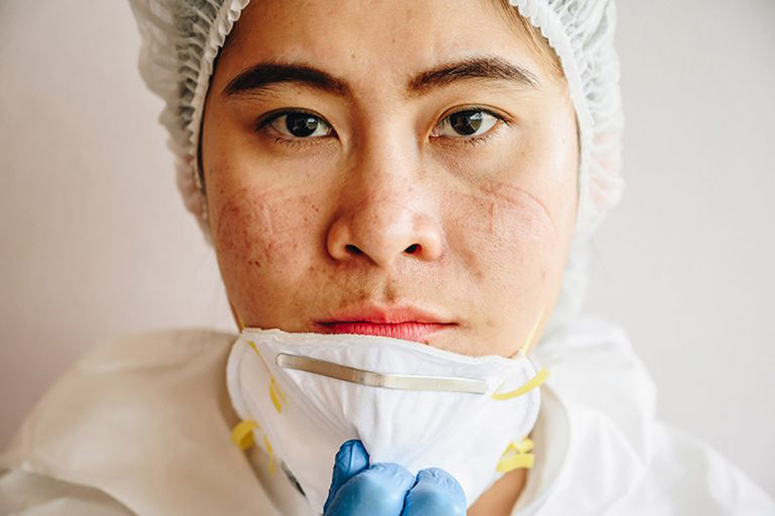How COVID and lockdown can affect your skin and hair
You may ask yourself, how is the COVID pandemic and lockdown affecting my skin? As a dermatologist, I have been seeing a surge in stress-related skin conditions like dandruff, hives, shingles, and flares of acne and eczema since quarantine started.
The pandemic is taking its toll on not just the physical, but also the emotional and mental health of all people. Our skin health and immunity can be impacted greatly by stress through the brain-skin axis.
Let us then address some of the most common concerns you may have regarding the pandemic and your skin.
Since I’ve been wearing a mask, I have noticed the skin around my nose, mouth and cheeks is red and itchy and there are pimples. What is maskne and how do I deal with it?
Prolonged mask wearing can lead to several skin eruptions, including maskne (acne mechanica), defined as pimples triggered by friction, or occlusion from mask use. Mask use increases skin temperature, sweating and oil production, and may cause fungus to grow, causing itching and irritation.
To avoid maskne, use a gentle cleanser to wash your face twice daily, avoid harsh acids and alcohols in your facial-care regimen, avoid clogging creams or makeup, and seek professional help for appropriate treatment
Prolonged use can worsen existing underlying skin conditions like atopic eczema, rosacea, contact urticaria and seborrheic dermatitis. Contact dermatitis is a skin allergy to mask components like rubber, metal or formalin.
To avoid maskne, use a gentle cleanser to wash your face twice daily, avoid harsh acids and alcohols in your facial-care regimen, avoid clogging creams or makeup, and seek professional help for appropriate treatment. Favor natural fibers for your mask (cotton, linen, or silk, but use a good filter in between cloth layers) and wash or iron these regularly.
Bio-functional mask textiles like silver-, copper oxide- and zinc oxide-impregnated fibers have antimicrobial benefits and are a good mask option. Your dermatologist can help you determine the cause of your “maskne” and help treat it properly.
Since the pandemic, I noticed lots of hair falling when I shower. What is causing my hair fall?
For people who have developed COVID, hair fall can be common after recovery, especially after experiencing high fevers.
Increased hair shedding, called “telogen effluvium,” can happen two to three months after a severe trauma to body or mind (high fever, infections, drug intake, surgery, delivery, severe psychological or emotional stress). This is because most hairs unnaturally cycle into the shedding phase, instead of staying in the growing phase.
Fortunately, hair shedding may resolve naturally after six to nine months. However, if your hair loss exceeds more than 100 strands per day, or you notice persistent scalp problems like redness, scaling or itching, a more thorough assessment by physical exam or even lab tests may be needed. See a dermatologist to rule out other causes of hair fall.
Is it true that the COVID vaccine can cause side effects for people who have had injectable fillers?
Skin reactions after the COVID-19 vaccination can include injection site redness, swelling, hives, and rashes. The US FDA reported rare facial-swelling reactions to dermal filler after the Moderna vaccination, but these all resolved by themselves.
There are still no other reports of filler reactions to the other vaccine brands. These delayed hypersensitivity reactions are very rare and are usually due to the COVID vaccine acting as an immune trigger to people with underlying genetic or autoimmune predisposition.
The only contraindication to getting COVID vaccination is a known allergy to vaccines and its ingredients like polyethylene glycol or polysorbate.
It is highly recommended that you seek COVID vaccination regardless of any cosmetic procedures previously done. You may seek advice and clearance from your doctor.
I’ve been washing my hands and applying alcohol-based hand gels frequently. I’ve noticed my hands developing bumps and itchy rashes. What can I do?

Hand washing is a pillar to prevent illness and viral transmission; however, frequent hand washing and alcohol-based hand rub use can dry our skin, damage our skin barrier, and destroy healthy skin microbes.
People can develop itchy, scaly rashes or blisters on their fingers, knuckles and webs due to accumulated moisture, friction, and allergies to harsh cleansers and chemicals, and fungal overgrowth.
To minimize these rashes, use a gentle hypoallergenic soap to wash hands, and apply moisturizing creams liberally immediately after washing hands or using alcohol-based cleansers.
When should I suspect that a skin rash is a sign of COVID infection?
Skin manifestation of COVID-19 may help early diagnosis of even asymptomatic infections. There are six major groups of COVID-related skin rashes:
- Generalized red rash (maculopapular) that may or may not be itchy;
- Hives or weals (urticaria);
- COVID toes (chilblains) which appear as swollen or painful fingers and toes;
- Chicken pox-like blisters (vesicles) on the trunk;
- Livedo racemosa, which is a net-like flat purple rash, usually on the legs; and
- Purpura, seen as small, pinpoint purple dots on the legs.
If you develop any of the previously described skin rashes (with or without fever, cough and difficulty of breathing), seek professional help immediately. You may search for a board-certified dermatologist in your area on www.pds.org.ph or the Philippine Dermatological Society Facebook page.


